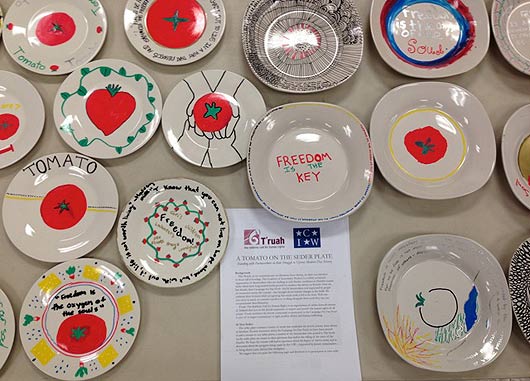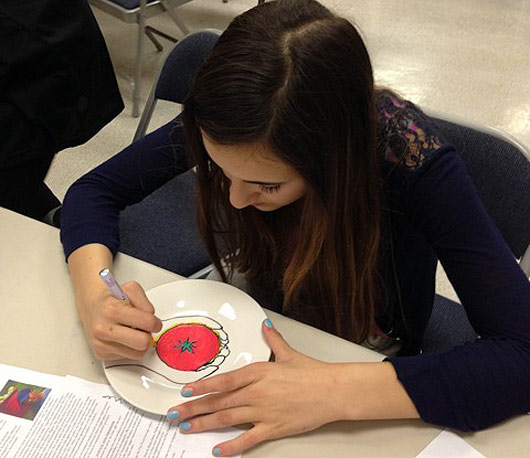
This Passover, join families across the country in celebrating a modern story of liberation with a tomato on the Seder plate!
This week, at hundreds of Passover Seders across the country, Florida’s modern story of farmworker liberation is sitting squarely at the center of the holiday table. Joining the bitter herbs (symbolizing the bitterness of slavery) and salt water (tears shed during enslavement) on the traditional Seder plate is a new item: a shiny red tomato.
This creative twist on the traditional recounting of the Jewish story of exodus from slavery to freedom comes courtesy of longtime CIW ally T’ruah (formerly Rabbis for Human Rights — North America). Rabbis associated with T’ruah from Atlanta to New York City have published op/eds rallying Jewish communities around the country to the innovative idea for raising consciousness about the new day for farmworkers in Florida’s tomato fields, and have even designed this Haggadah Supplement (available for download and personal use). Here’s an excerpt from one such op/ed, this one from Rabbi Eric Soloman in North Carolina (“From Farm to (Seder) Plate: Supporting a New Crop of Modern-day Isaiahs,” Zeek, 3/22/13):
… This Passover, as we retell the Jewish founding narrative of our exodus from slavery to freedom, I’ll be proud to be one of hundreds of rabbis around the country raising my voice to protect the rights and dignity of tomato workers and let our communities know more about how asking the right questions and making small changes in our consumer behavior can have an enormous impact…… This Passover, I hope you’ll join me in adding a tomato to your Seder plate. Hopefully, it will lead to a consciousness-raising conversation among your friends and family about the tomato industry, farmworker abuse, and the Campaign for Fair Food. But don’t stop there. A few days later, make a date with your Seder guests to meet at the local supermarket. Find the manager and ask, “Do you know if your store has joined the Fair Food Program, the only proven solution to poverty and modern-day slavery in the Florida tomato industry?” That’s the only way we will make it to the Promised Land of a just agriculture industry, may it happen speedily in our days.” read more >>
Rabbi Rachel Kahn-Troster, Director of North American Programs for T’ruah and a participant along with her daughter in the March for Rights, Respect, and Fair Food earlier this month (they’re shown together in the photo below at the march), also penned her own op/ed, writing in the pages of the New York Daily News (“Why I’m putting a tomato on my seder plate,” NY Daily News, 3/24/13):
“… But the Passover story wouldn’t be complete if we only saw it as a story of slavery and misery — it is also a story of liberation, with the Israelites leaving Egypt and crossing the Sea of Reeds to freedom.
Likewise, the tomato on the seder plate is not just a symbol of exploitation, but of the new day dawning in the Florida tomato industry, thanks to the historic efforts of the Coalition of Immokalee Workers.
The Fair Food Program of this worker-led group fights modern slavery at its root causes, asking growers to institute a human-rights code of conduct in the fields and asking corporate buyers (like grocery stores and fast food chains) to pay a one-penny-per-pound premium for tomatoes that goes straight to workers.
The CIW’s efforts are making a real difference in the lives of the people who pick the food we eat every day. To date, 11 major corporations (including Whole Foods and Taco Bell) and close to 90% of Florida’s tomato growers have signed Fair Food Agreements to ensure that the workers who pick their food are treated with respect.
But not everyone is on board: most grocery stores (for example, Publix and Stop & Shop) and restaurants like Wendy’s have not yet signed Fair Food Agreements, making them participants in the exploitation of these men and women.” read more >>
From coast to coast, we’ve received word that the Fair Food Program has indeed been the talk of many a Seder table — and that some groups have even given the new tradition their own flair. The Workmen’s Circle in Boston, MA, crafted their own “Tomato on the Seder Plate” cards and have already distributed almost 300 of them at schools and Seders throughout New York City and Long Island. Meanwhile, at Yavneh Day School in CA, every 5th-8th grader spent a entire day on the theme of farmworker justice that spanned all subjects (yes, even in math class, where they constructed word problems on the penny-per-pound… hmm… let’s see… If CA-based Ralph’s buys 20 million pounds of Florida tomatoes a year, and Ralph’s parent company Kroger finally decides to join the Fair Food Program and pay a penny-per-pound to help raise farmworkers’s pay, how many more dollars will go to Florida farmworkers and their families thanks to Ralph’s? We’ll let you do the math!). They even painted the beautiful plates featured at the top of this post:

We’ll wrap-up today’s post with the words of a young person delivered pre-Passover, as part of her D’var Torah, the sermon one gives in the Jewish rite of passage process of becoming a Bar or Bat Mitzvah. She delivered it on the eve of the 200-mile march, and it is a keen reminder of the transformative power of actions for social justice in a young person’s life. This young woman, Leila, marched to Stop & Shop with the CIW in Boston in the snow two years ago at age 11, and now at age 13, when it came time for her to share her thoughts and analysis with a large audience for the first time, she chose to share her reflection on the march. Here’s Leila, speaking on the topic of wisdom:
“Another kind of modern wisdom, to me, has to do with courage. The workers in Immokalee, Florida, who pick tomatoes for often less that a living wage, had and still have the wisdom to know that what is going on was and is not right, and how to remedy that by standing up and protesting. The same kind of wisdom was shared, I believe, by the mass of people who I marched with, in the rain, to fight for the tomato pickers: the wisdom to know what is wrong and how to fight for what’s right.”
This year, a tomato on the seder plate.
Next year, perhaps, Publix too will have developed the wisdom, as Leila has, to know what wrong is and how to right it.
